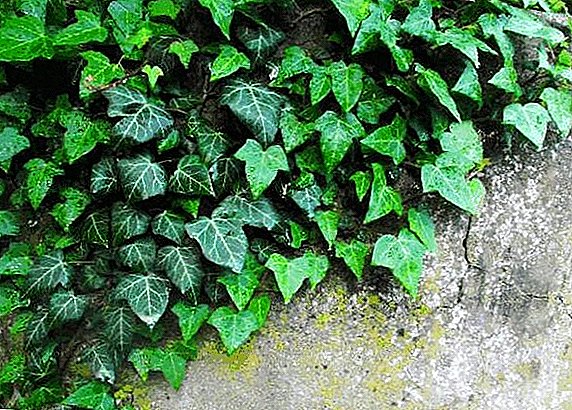 The rabbit organism is designed in such a way that hunger is contraindicated. The new food consumed by the rabbit, simply pushes the previously accepted feed on the animal's digestive system further. Without this, a deadly stagnation in the animal’s body can happen. Therefore, food must be constantly present in rabbit cages and cages. But this does not apply to legumes and, in particular, to peas. About why this is so will be discussed further.
The rabbit organism is designed in such a way that hunger is contraindicated. The new food consumed by the rabbit, simply pushes the previously accepted feed on the animal's digestive system further. Without this, a deadly stagnation in the animal’s body can happen. Therefore, food must be constantly present in rabbit cages and cages. But this does not apply to legumes and, in particular, to peas. About why this is so will be discussed further.
Can I give peas to rabbits
Experienced breeders are confident that these animals just need to replenish the diet with legumes, the most accessible and popular of which is pea.
This type of food is saturated:
- vegetable protein;
- B vitamins;
- mineral substances, which number above 20;
- amino acids;
- organic matter.
Did you know? Archaeological excavations indicate that peas were used by man in the Stone Age. So the expression "under the Tsar Pea", speaking about the extreme degree of prescription, appeared far not by chance.
The use of this representative of legumes by rabbits saturates their body with proteins that promote muscle building, that is, the desired meat, provides it with vitamins, minerals and amino acids that stimulate the growth and strengthening of the immune system of these tender creatures.
All these pea nutrients are especially valuable for pregnant and lactating females. However, with all its valuable nutritional qualities, this type of food in no way can serve as the main, but can only serve as an addition to the rabbit diet.  Excessive use of it inevitably leads to disruption of the functioning of the gastrointestinal tract and is most often manifested in bloating due to the active production of gases. This is especially true for ornamental and dwarf rabbits, which is why they are recommended to give this legume culture no more than once a week.
Excessive use of it inevitably leads to disruption of the functioning of the gastrointestinal tract and is most often manifested in bloating due to the active production of gases. This is especially true for ornamental and dwarf rabbits, which is why they are recommended to give this legume culture no more than once a week.
Feeding rules
Most experts believe that rabbits can be given peas from a month of age, but some argue that they should not be done until animals reach seven months of age.
Important! But all the breeders are confident that in no case should the peas be fed to the peas, which have not yet turned a month.
This product can be included in a rabbit diet in three forms:
- fresh;
- dried;
- as tops and pods.
Depending on the type of pea product, the way they feed rabbits also varies. For example, fresh, fresh from the garden, the product can not be immediately given to animals.
It must first be in the air, then turned into a mush and added to the main feed. Plant and pods are also given not in fresh, but in dried or dried form. 
Dry pea
This dried bean product should not be given to animals without prior treatment.
To do this, it should:
- Rinse well.
- Pour boiling water.
- Add to it table salt at the rate of half a tablespoon for every liter of water.
- Leave to swell for two hours.
- Swollen peas can be mixed with grated sugar beets, carrots, bran or silage.
Familiarize yourself with the subtleties of feeding rabbits at home.
Peas in steamed
Dried green peas are also recommended to steam.
For this:
- To a certain amount of product is added double the volume of boiling water.
- To every three liters of boiling water is added 20 grams of salt.
- Peas swell for two hours.
- The swollen product is turned into a puree and added to the feed or cereal products.
Video: feeding rabbits with peas
Contraindications and harm
As already mentioned, this product is absolutely contraindicated for baby rabbits younger than one month old.
Excessive consumption of this legume can also harm adults in the form of:
- intestinal disorders;
- active gas generation;
- abdominal distention;
- loss of appetite.
We advise you to read about whether it is possible to give nettle, burdock, corn, beetroot, pumpkin, cereals, bread, wormwood, bran to rabbits, and also find out how to water the rabbits and what grass to feed the rabbits.
What else can be given to rabbits
In addition to peas, these animals are happy to eat other legumes in the form of:
- beans;
- lentils;
- soybean;
- beans.
 Extremely nutritious product that contributes to the rapid and high-quality growth of rabbits, peas also have their opposite side, in which its excessive consumption can cause harm to animals, even incompatible with life.
Extremely nutritious product that contributes to the rapid and high-quality growth of rabbits, peas also have their opposite side, in which its excessive consumption can cause harm to animals, even incompatible with life.Did you know? Dried peas are an extremely durable product that can retain all of its beneficial and nutritional qualities for a dozen years.Therefore, when it is included in the rabbit diet, moderation and caution should be observed.












